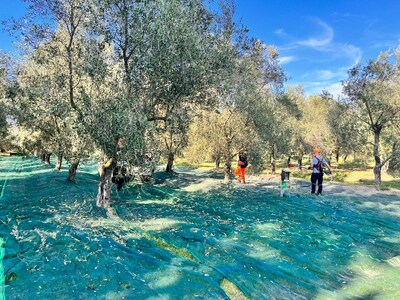Filippo Berio shares 2023/24 harvest update; challenges remain but cautious optimism for future olive oil production
Below-average yields for 2023/24 signal higher prices ahead and gravitation toward trusted producers; cautious optimism voiced for next harvest
LYNDHURST, N.J., April 4, 2024 /PRNewswire/ -- Filippo Berio, one of the nation's top-selling olive oil and pesto sauce companies, is reporting on the 2023/24 harvest, anticipating a challenging year in sourcing high-quality olive oil as production estimates for this harvest period are little higher than 2022/23 crop yields, which were the lowest in 30 years. As of mid-March, the European Commission expected its nine olive-producing members to produce 1.48 million metric tons, up from 1.39 million metric tons the previous year, but still roughly 20% lower than the average of the previous five harvests. Additionally, non-European Union countries, collectively, are expected to realize a decline in production, further exerting pressure on supply and raw material costs. The evolving scenario could result in elevated prices at retailers as consumers seek out trusted, high-quality products that deliver consistent flavor profiles and important health benefits.
"Global harvests for olive oil production remain far below what we'd like to see in order to fulfill demand for this versatile and healthy pantry staple," said Dusan Kaljevic, CEO of Filippo Berio USA, Ltd. "At Filippo Berio, we will continue to leverage our global network of suppliers and the talents of our master blenders to deliver products of superior quality and with a consistent organoleptic profile that our customers expect in every bottle and that is clearly advertised on every label."
Harvest results are uneven among olive-producing countries
For the 2023/24 harvest season, certain olive-producing regions have rebounded somewhat from last year's downturn. The European Commission reports that Italy, for instance, is expected to produce 330,000 tons, a nearly 38% increase from 240,000 tons harvested last season. Spain is anticipated to increase its harvest by about 27% to 845,000 tons, though it will still be well behind historical production levels, which have reached 1.7 million tons or more in peak years. Two consecutive years of disappointing harvest in Spain, the world's largest olive oil producer, have contributed to tight supply and higher prices (up 50% in the EU in the past year). Outside Europe, Tunisia is experiencing a strong year, with the harvest expected to increase more than 20% to 220,000 tons, from 180,000 tons previously.
While certain areas are seeing some recovery, many others continue to struggle. Greece's production is expected to fall from 345,500 tons last season to just 155,000 tons for 2023/24. Additionally, non-EU production is expected to decline about 14% in total, with lower yields in Turkey (50% less, by some estimates, compared to last year), Morocco and Syria. Drought and extreme temperatures during critical points of the growing seasons contributed to the declines.
"European and Mediterranean countries have experienced challenges in the olive groves, and we continue to search the world over as we source the best raw material for our olive oil," explained Kaljevic. "We're seeing growing production from the southern hemisphere, particularly in Argentina and Chile, where the harvest comes at a fortuitous time to augment our own supply."
Prices are increasing, but demand persists in U.S.
As the olive oil supply remains constrained for the second year in a row, the cost of raw material has grown. The price of extra virgin olive oil from Tunisia was up 61% for March 2024 as compared to the same period in 2023, while extra virgin olive oil from Greece was up nearly 78% and in Spain prices rose almost 73%. Financing costs for producers have also risen, as interest rates have come up from pandemic-era lows of 2% to 6%. Increased costs have, at least in part, driven retail prices higher, and while some markets have seen a pullback in demand, the U.S. has remained fairly steady.
"The U.S. market has been relatively resistant to pricing pressure and has moderated its demand of olive oil only slightly, which we believe speaks to the market's appreciation of the health and culinary benefits of high-quality extra virgin olive oil," Kaljevic stated. "Olive oil has been shown to support heart health and cognitive health, and to contain anti-inflammatory properties. Americans have shown that they are willing to spend more on products that support wellness, and once they experience the superior flavor and versatility of olive oil, we expect more consumers to adopt it for their everyday needs."
The U.S. continues to present a compelling growth market for olive oil companies, as household penetration is modest. The market can be challenging, however, as companies navigate stringent import requirements while working to source the best quality olive oil amid heavy competition for a limited supply. Further, companies must consider the flavor and aroma profile of the raw ingredients they can source, as characteristics of olive oils tend to vary each harvest depending on conditions in the regions from which they originate.
Filippo Berio's master blenders are key to quality
Each year, Filippo Berio's team of master blenders engage with longstanding suppliers to sample olive oils, fresh from a new harvest. Much like winemakers assess the profiles of diverse varietals to blend with precision to achieve a certain flavor profile, Filippo Berio's master blenders seek quality olive oils with desired characteristics to create a distinct blend deserving of the Filippo Berio label.
"Our master blenders travel the world to select the olive oils that are eventually blended into our final products," explained Kaljevic. "Highly trained and experienced, they work to achieve a consistent organoleptic profile in each variety we deliver. Our consumers can be confident about the flavors and the quality they will experience from every single bottle, knowing that the olive oil they choose to pair with a specific cuisine or recipe will provide the desired result every time."
The master blenders' mission is always a challenge, as Mother Nature and growing conditions will influence not only the quantity of olive fruit produced, but the ultimate taste, aroma and texture of the oils extracted. Each year, master blenders must adjust which olive varietals are selected, from which part of the world and in which proportion. Further, years of experience and scientific knowledge are crucial to understanding how different varietals will interact to bring out key flavors in a blend's profile ? such as the distinct peppery notes and fresh cut grass nuances of Filippo Berio Robusto Extra Virgin Olive Oil. In doing so, master blenders must also consider how the oils will change over time, adjusting their formula to ensure consistency of a product throughout its shelf life.
"Each harvest, we are recreating a masterpiece, but from a completely different palette of oils," said Kaljevic. "We are proud of our master blenders' skills and abilities to offer consumers a consistently high-quality product year after year, even though the harvest itself may not be ideal."
Conditions are currently supportive for 2024/25
After two years of disappointing yields, Filippo Berio is looking ahead to the potential of the upcoming 2024/25 harvest season. Although it is still early, winter conditions have so far been favorable to olive-producing countries in the Mediterranean region. The lack of extreme high or low temperatures should be beneficial during the vital incubation period. Additionally, solid seasonal rainfalls are replenishing depleted natural water reserves.
"Winter has been good to olive growers, and now our eyes are on spring and summer," said Kaljevic. "April is a critical month for flowering, and we hope to see moderate temperatures and weather continue. If we see a more traditional growing period, we believe that yields could rebound significantly and ease pressure on olive oil producers and end consumers."
For now, Filippo Berio is focusing on sourcing the best quality oils from its network of global suppliers to fulfill anticipated demand, not only for its olive oil product lines but its other products ? including pestos and tomato-based sauces ? that use olive oil as an essential ingredient. More information about Filippo Berio products is available at filippoberio.com.
About Filippo Berio:
The Filippo Berio brand has been committed to creating high-quality olive oil for 156 years. Founder Filippo Berio set forth exceptional standards of olive oil production that are still rigorously followed today, with each bottle sold bearing his signature as a seal of the finest olive oil and the brand's promise of quality. From distinctive olive oils to a selection of specialty pestos, tomato-based sauces, wine vinegars, balsamic vinegars and glazes, all featuring the finest ingredients and high production standards, the Italian brand focuses on creating great-tasting and accessible products to elevate the at-home cooking and eating experience. The brand is currently sold in more than 75 countries. In the United States, Filippo Berio is marketed by Filippo Berio USA, a wholly owned subsidiary of the Salov Group, based in Lucca, Italy. For additional information, please visit filippoberio.com.
Filippo Berio Media Contact:
Hannah Castle, 510-590-0195
[email protected]
SOURCE Filippo Berio
News published on and distributed by:





